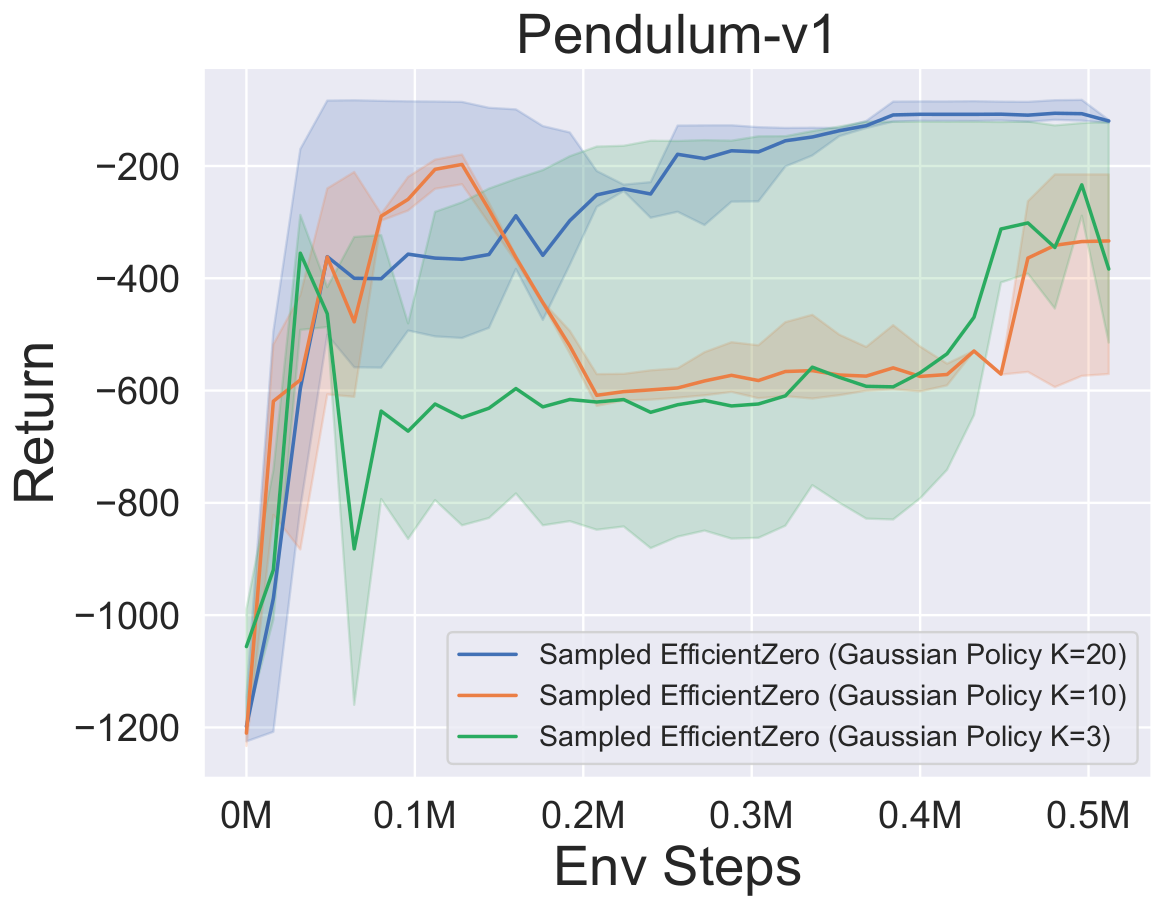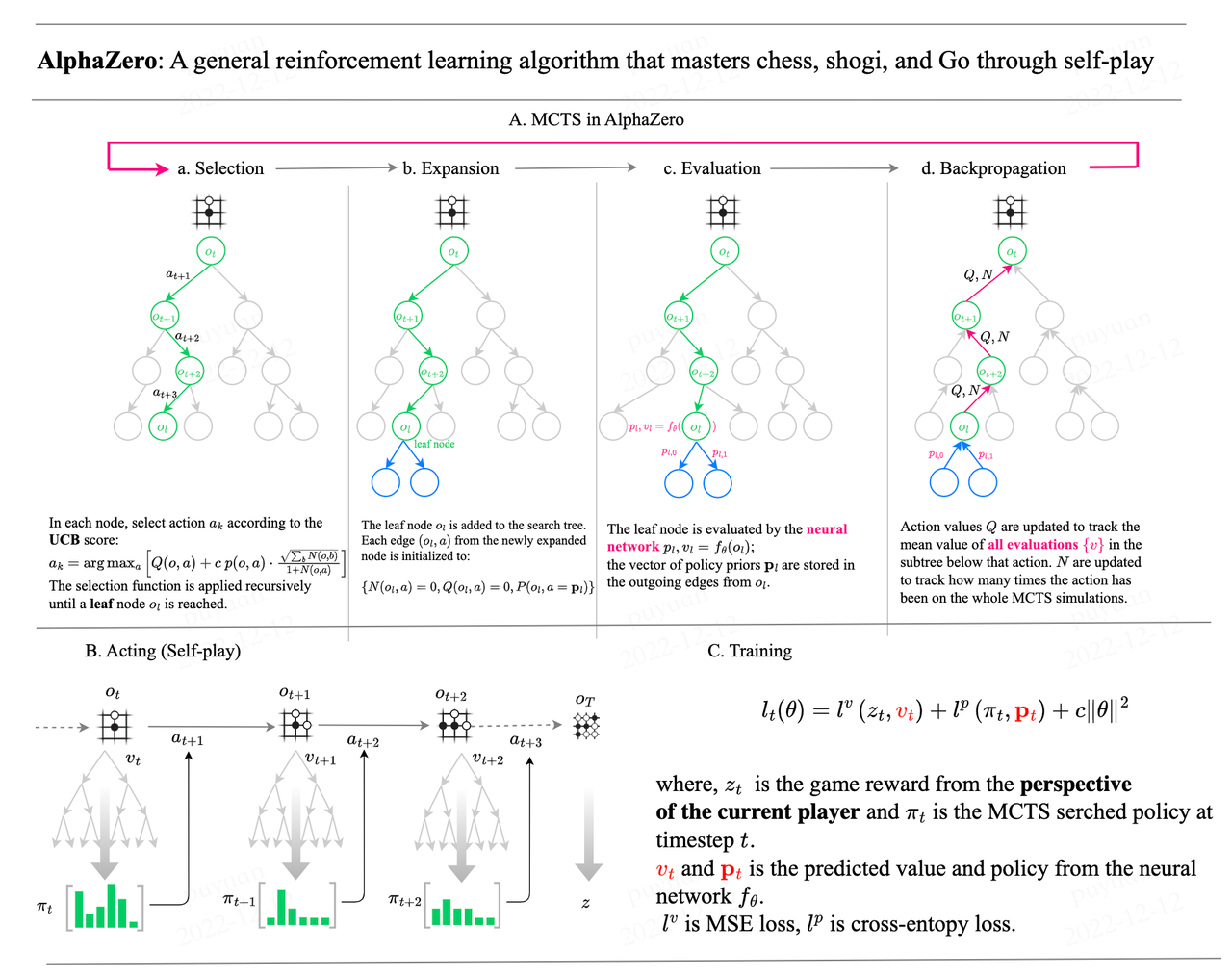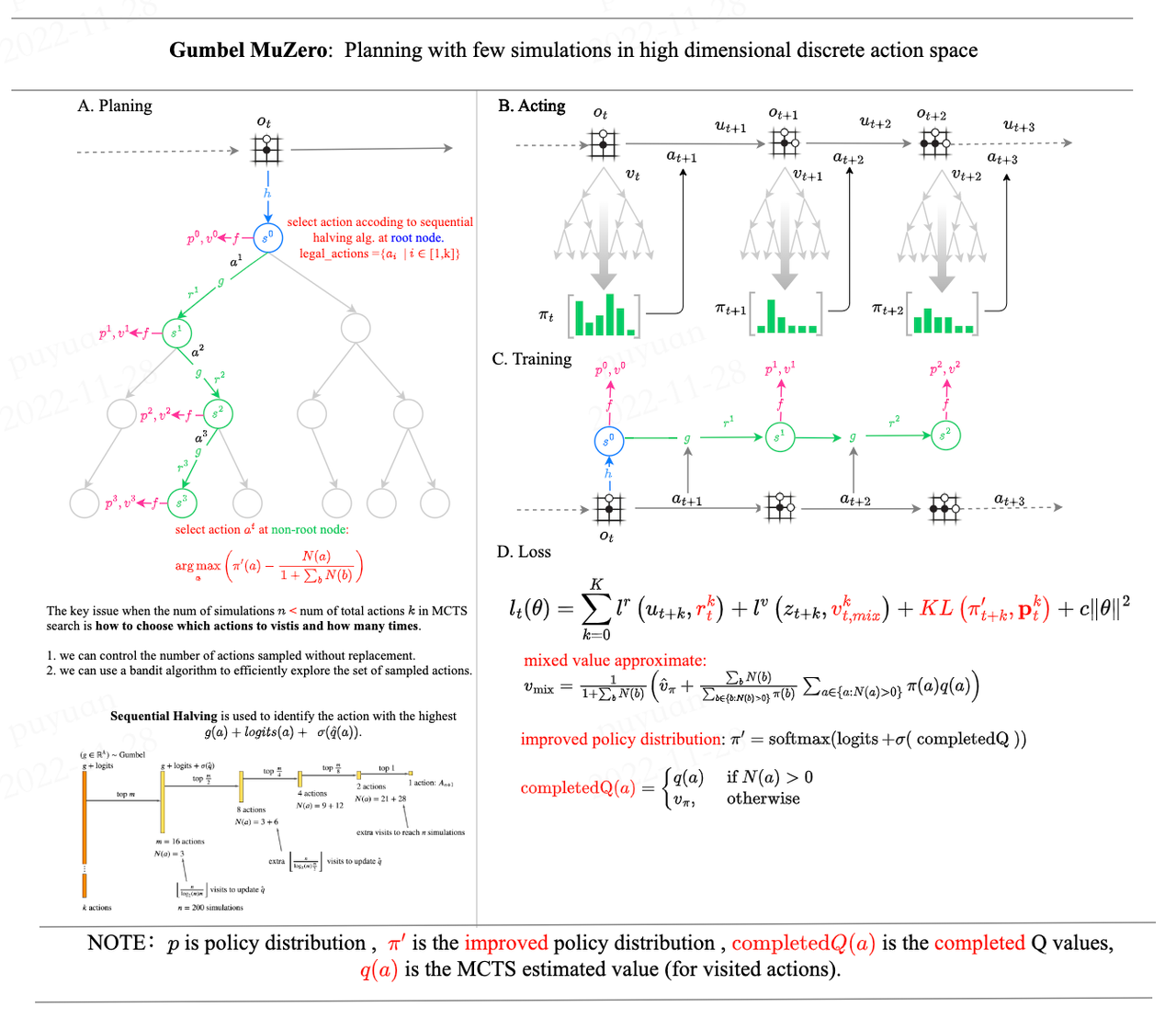LightZero is a lightweight, efficient, and easy-to-understand open-source algorithm toolkits that combines Monte Carlo Tree Search (MCTS) and Deep Reinforcement Learning (RL).
English | 简体中文
The method of combining Monte Carlo Tree Search and Deep Reinforcement Learning represented by AlphaZero and MuZero has achieved superhuman level in various games such as Go and Atari, has also made gratifying progress in scientific fields such as protein structure prediction, matrix multiplication algorithm search, etc.
The following is an overview of the historical evolution of the Monte Carlo Tree Search algorithm series:

LightZero is an open-source algorithm toolkits that combines MCTS and RL for PyTorch. It provides support for a range of MCTS-based RL algorithms and applications with following advantages:
- Lightweight.
- Efficient.
- Easy-to-understand.
For further details, please refer to Features, Framework Structure and Integrated Algorithms.
LightZero aims to promote the standardization of the MCTS+RL algorithm family to accelerate related research and applications. A performance comparison of all implemented algorithms under a unified framework is presented in the Benchmark.
- Overview
- Installation
- Quick Start
- Benchmark
- Awesome-MCTS Notes
- Awesome-MCTS Papers
- Feedback and Contribution
- Citation
- Acknowledgments
- License
Lightweight: LightZero integrates multiple MCTS algorithm families and can solve decision-making problems with various attributes in a lightweight framework. The algorithms and environments LightZero implemented can be found here.
Efficient: LightZero uses mixed heterogeneous computing programming to improve computational efficiency for the most time-consuming part of MCTS algorithms.
Easy-to-understand: LightZero provides detailed documentation and algorithm framework diagrams for all integrated algorithms to help users understand the algorithm's core and compare the differences and similarities between algorithms under the same paradigm. LightZero also provides function call graphs and network structure diagrams for algorithm code implementation, making it easier for users to locate critical code. All the documentations can be found here.
The above picture is the framework pipeline of LightZero. We briefly introduce the three core modules below:
Model:
Model is used to define the network structure, including the __init__ function for initializing the network structure and the forward function for computing the network's forward propagation.
Policy:
Policy defines the way the network is updated and interacts with the environment, including three processes: the learning process, the collecting process, and the evaluation process.
MCTS:
MCTS defines the structure of the Monte Carlo search tree and the way it interacts with the Policy. The implementation of MCTS includes two languages: Python and C++, implemented in ptree and ctree, respectively.
For the file structure of LightZero, please refer to lightzero_file_structure.
LightZero is a library with a PyTorch implementation of MCTS algorithms (sometimes combined with cython and cpp), including:
The environments and algorithms currently supported by LightZero are shown in the table below:
| Env./Alg. | AlphaZero | MuZero | EfficientZero | Sampled EfficientZero |
|---|---|---|---|---|
| Atari | --- | ✔ | ✔ | ✔ |
| tictactoe | ✔ | ✔ | 🔒 | 🔒 |
| gomoku | ✔ | ✔ | 🔒 | 🔒 |
| chess | 🔒 | 🔒 | 🔒 | 🔒 |
| go | 🔒 | 🔒 | 🔒 | 🔒 |
| lunarlander | --- | ✔ | ✔ | ✔ |
| bipedalwalker | --- | ✔ | ✔ | ✔ |
| cartpole | --- | ✔ | ✔ | ✔ |
| pendulum | --- | ✔ | ✔ | ✔ |
(1): "✔" means that the corresponding item is finished and well-tested.
(2): "🔒" means that the corresponding item is in the waitinglist (Work In Progress).
(3): "---" means that this algorithm doesn't support this environment.
You can install latest LightZero in development from the GitHub source codes with the following command:
git clone https://github.com/opendilab/LightZero.git
cd LightZero
pip3 install -e .Train a MuZero agent to play CartPole:
cd LightZero
python3 -u zoo/classic_control/cartpole/config/cartpole_muzero_config.pyTrain a MuZero agent to play Pong:
cd LightZero
python3 -u zoo/atari/config/atari_muzero_config.pyTrain a MuZero agent to play TicTacToe:
cd LightZero
python3 -u zoo/board_games/tictactoe/config/tictactoe_muzero_bot_mode_config.pyClick to collapse
Below are the benchmark results of MuZero, MuZero w/ SSL , EfficientZero and Sampled EfficientZero on three discrete action space games in Atari.
Below are the benchmark results of Sampled EfficientZero with Factored/Gaussian policy representation on three continuous action space games: Pendulum-v1, LunarLanderContinuous-v2, BipedalWalker-v3.
Where
Factored Policyindicates that the agent learns a policy network that outputs a categorical distribution, the dimensions of the action space for the three environments are 11, 49 (7^2), and 256 (4^4), respectively, after manual discretization. On the other hand,Gaussian Policyindicates that the agent learns a policy network that outputs parameters (mu and sigma) for a Gaussian distribution.
Below are the benchmark results of AlphaZero and MuZero on two board_games: TicTacToe, Gomoku.
The following are the detailed paper notes (in Chinese) of the above algorithms:
Click to collapse
The following are the overview MCTS principle diagrams of the above algorithms:
Here is a collection of research papers about Monte Carlo Tree Search. This Section will be continuously updated to track the frontier of MCTS.
Click to expand
- 2018 Science AlphaZero: A general reinforcement learning algorithm that masters chess, shogi, and Go through self-play
- 2019 MuZero: Mastering Atari, Go, Chess and Shogi by Planning with a Learned Model
- 2021 EfficientZero: Mastering Atari Games with Limited Data
- 2021 Sampled MuZero: Learning and Planning in Complex Action Spaces
- 2015 Nature AlphaGo Mastering the game of Go with deep neural networks and tree search
- 2017 Nature AlphaGo Zero Mastering the game of Go without human knowledge
- 2019 ELF OpenGo: An Analysis and Open Reimplementation of AlphaZero
- 2022 Online and Offline Reinforcement Learning by Planning with a Learned Model
- 2021 Vector Quantized Models for Planning
- 2022 Stochastic MuZero: Plannig in Stochastic Environments with A Learned Model
- 2021 Muesli: Combining Improvements in Policy Optimization.
- 2020 Monte-Carlo Tree Search as Regularized Policy Optimization
- 2021 Self-Consistent Models and Values
- 2022 Adversarial Policies Beat Professional-Level Go AIs
- 2022 PNAS Acquisition of Chess Knowledge in AlphaZero.
- 2022 Nature Discovering faster matrix multiplication algorithms with reinforcement learning
- 2022 MuZero with Self-competition for Rate Control in VP9 Video Compression
- 2021 DouZero: Mastering DouDizhu with Self-Play Deep Reinforcement Learning
- 2019 Combining Planning and Deep Reinforcement Learning in Tactical Decision Making for Autonomous Driving
Click to expand
- Efficient Learning for AlphaZero via Path Consistency 2022
- Dengwei Zhao, Shikui Tu, Lei Xu
- Key: limited amount of self-plays, path consistency (PC) optimality
- ExpEnv: Go, Othello, Gomoku
- Convex Regularization in Monte-Carlo Tree Search 2021
- Tuan Dam, Carlo D'Eramo, Jan Peters, Joni Pajarinen
- Key: entropy-regularization backup operators, regret analysis, Tsallis etropy,
- ExpEnv: synthetic tree, Atari
- Information Particle Filter Tree: An Online Algorithm for POMDPs with Belief-Based Rewards on Continuous Domains 2020
- Johannes Fischer, Ömer Sahin Tas
- Key: Continuous POMDP, Particle Filter Tree, information-based reward shaping, Information Gathering.
- ExpEnv: POMDPs.jl framework
- Code
- Retro*: Learning Retrosynthetic Planning with Neural Guided A* Search 2020
- Binghong Chen, Chengtao Li, Hanjun Dai, Le Song
- Key: chemical retrosynthetic planning, neural-based A*-like algorithm, ANDOR tree
- ExpEnv: USPTO datasets
- Code
- SpeedyZero: Mastering Atari with Limited Data and Time 2023
- Yixuan Mei, Jiaxuan Gao, Weirui Ye, Shaohuai Liu, Yang Gao, Yi Wu
- Key: distributed RL system, Priority Refresh, Clipped LARS
- ExpEnv: Atari
- Efficient Offline Policy Optimization with a Learned Model 2023
- Zichen Liu, Siyi Li, Wee Sun Lee, Shuicheng YAN, Zhongwen Xu
- Key: Regularized One-Step Model-based algorithm for Offline-RL
- ExpEnv: Atari,BSuite
- Code
- Enabling Arbitrary Translation Objectives with Adaptive Tree Search 2022
- Wang Ling, Wojciech Stokowiec, Domenic Donato, Chris Dyer, Lei Yu, Laurent Sartran, Austin Matthews
- Key: adaptive tree search, translation models, autoregressive models,
- ExpEnv: Chinese–English and Pashto–English tasks from WMT2020, German–English from WMT2014
- What's Wrong with Deep Learning in Tree Search for Combinatorial Optimization 2022
- Maximili1an Böther, Otto Kißig, Martin Taraz, Sarel Cohen, Karen Seidel, Tobias Friedrich
- Key: Combinatorial optimization, open-source benchmark suite for the NP-hard MAXIMUM INDEPENDENT SET problem, an in-depth analysis of the popular guided tree search algorithm, compare the tree search implementations to other solvers
- ExpEnv: NP-hard MAXIMUM INDEPENDENT SET.
- Code
- Monte-Carlo Planning and Learning with Language Action Value Estimates 2021
- Youngsoo Jang, Seokin Seo, Jongmin Lee, Kee-Eung Kim
- Key: Monte-Carlo tree search with language-driven exploration, locally optimistic language value estimates,
- ExpEnv: Interactive Fiction (IF) games
- Practical Massively Parallel Monte-Carlo Tree Search Applied to Molecular Design 2021
- Xiufeng Yang, Tanuj Kr Aasawat, Kazuki Yoshizoe
- Key: massively parallel Monte-Carlo Tree Search, molecular design, Hash-driven parallel search,
- ExpEnv: octanol-water partition coefficient (logP) penalized by the synthetic accessibility (SA) and large Ring Penalty score.
- Watch the Unobserved: A Simple Approach to Parallelizing Monte Carlo Tree Search 2020
- Anji Liu, Jianshu Chen, Mingze Yu, Yu Zhai, Xuewen Zhou, Ji Liu
- Key: parallel Monte-Carlo Tree Search, partition the tree into sub-trees efficiently, compare the observation ratio of each processor
- ExpEnv: speedup and performance comparison on JOY-CITY game, average episode return on atari game
- Code
- Learning to Plan in High Dimensions via Neural Exploration-Exploitation Trees 2020
- Binghong Chen, Bo Dai, Qinjie Lin, Guo Ye, Han Liu, Le Song
- Key: meta path planning algorithm, exploits a novel neural architecture which can learn promising search directions from problem structures.
- ExpEnv: a 2d workspace with a 2 DoF (degrees of freedom) point robot, a 3 DoF stick robot and a 5 DoF snake robot
- Planning for Sample Efficient Imitation Learning 2022
- Zhao-Heng Yin, Weirui Ye, Qifeng Chen, Yang Gao
- Key: Behavioral Cloning,Adversarial Imitation Learning (AIL),MCTS-based RL,
- ExpEnv: DeepMind Control Suite
- Code
- Evaluation Beyond Task Performance: Analyzing Concepts in AlphaZero in Hex 2022
- Charles Lovering, Jessica Zosa Forde, George Konidaris, Ellie Pavlick, Michael L. Littman
- Key: AlphaZero’s internal representations, model probing and behavioral tests, how these concepts are captured in the network.
- ExpEnv: Hex
- Are AlphaZero-like Agents Robust to Adversarial Perturbations? 2022
- Li-Cheng Lan, Huan Zhang, Ti-Rong Wu, Meng-Yu Tsai, I-Chen Wu, 4 Cho-Jui Hsieh
- Key: adversarial states, first adversarial attack on Go AIs
- ExpEnv: Go
- Monte Carlo Tree Descent for Black-Box Optimization 2022
- Yaoguang Zhai, Sicun Gao
- Key: Black-Box Optimization, how to further integrate samplebased descent for faster optimization.
- ExpEnv: synthetic functions for nonlinear optimization, reinforcement learning problems in MuJoCo locomotion environments, and optimization problems in Neural Architecture Search (NAS).
- Monte Carlo Tree Search based Variable Selection for High Dimensional Bayesian Optimization 2022
- Lei Song∗ , Ke Xue∗ , Xiaobin Huang, Chao Qian
- Key: a low-dimensional subspace via MCTS, optimizes in the subspace with any Bayesian optimization algorithm.
- ExpEnv: NAS-bench problems and MuJoCo locomotion
- Monte Carlo Tree Search With Iteratively Refining State Abstractions 2021
- Samuel Sokota, Caleb Ho, Zaheen Ahmad, J. Zico Kolter
- Key: stochastic environments, Progressive widening, abstraction refining,
- ExpEnv: Blackjack, Trap, five by five Go.
- Deep Synoptic Monte Carlo Planning in Reconnaissance Blind Chess 2021
- Gregory Clark
- Key: imperfect information, belief state with an unweighted particle filter, a novel stochastic abstraction of information states.
- ExpEnv: reconnaissance blind chess
- POLY-HOOT: Monte-Carlo Planning in Continuous Space MDPs with Non-Asymptotic Analysis 2020
- Weichao Mao, Kaiqing Zhang, Qiaomin Xie, Tamer Ba¸sar
- Key: continuous state-action spaces, Hierarchical Optimistic Optimization,
- ExpEnv: CartPole, Inverted Pendulum, Swing-up, and LunarLander.
- Learning Search Space Partition for Black-box Optimization using Monte Carlo Tree Search 2020
- Linnan Wang, Rodrigo Fonseca, Yuandong Tian
- Key: learns the partition of the search space using a few samples, a nonlinear decision boundary and learns a local model to pick good candidates.
- ExpEnv: MuJoCo locomotion tasks, Small-scale Benchmarks,
- Mix and Match: An Optimistic Tree-Search Approach for Learning Models from Mixture Distributions 2020
- Matthew Faw, Rajat Sen, Karthikeyan Shanmugam, Constantine Caramanis, Sanjay Shakkottai
- Key: covariate shift problem, Mix&Match combines stochastic gradient descent (SGD) with optimistic tree search and model re-use (evolving partially trained models with samples from different mixture distributions)
- Code
- On Monte Carlo Tree Search and Reinforcement Learning Journal of Artificial Intelligence Research 2017.
- Sample-Efficient Neural Architecture Search by Learning Actions for Monte Carlo Tree Search IEEE Transactions on Pattern Analysis and Machine Intelligence 2022.
-
File an issue on Github
-
Contact our email ([email protected])
-
We appreciate all the feedbacks and contributions to improve LightZero, both algorithms and system designs.
@misc{lightzero,
title={{LightZero: OpenDILab} A lightweight and efficient toolkit designed for the MCTS, AlphaZero, and MuZero family of algorithms.},
author={LightZero Contributors},
publisher = {GitHub},
howpublished = {\url{https://github.com/opendilab/LightZero}},
year={2023},
}This repo is partially based on the following repo, many thanks to their pioneering work:
- https://github.com/opendilab/DI-engine
- https://github.com/YeWR/EfficientZero
- https://github.com/werner-duvaud/muzero-general
Special thanks to @PaParaZz1, @karroyan, @nighood, @jayyoung0802, @timothijoe, @TuTuHuss, @puyuan1996, @HansBug for their contributions and support.
All code within this repository is under Apache License 2.0.





























